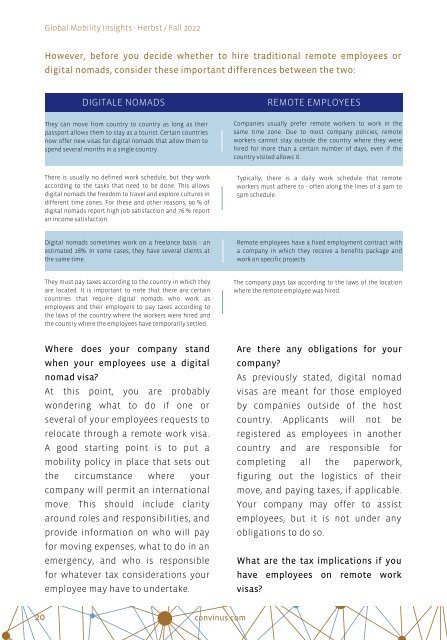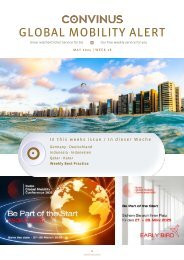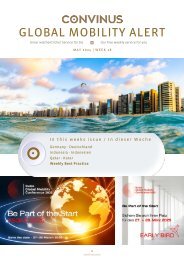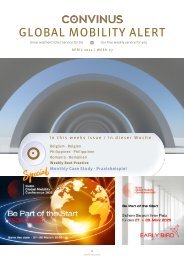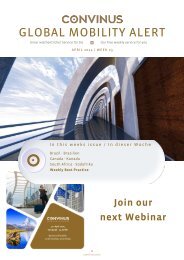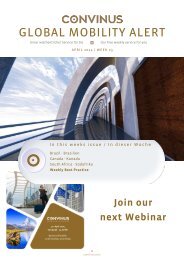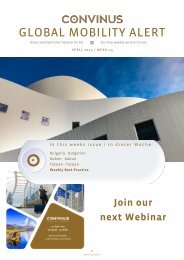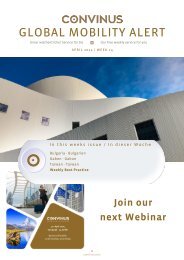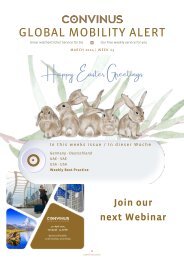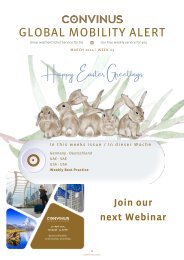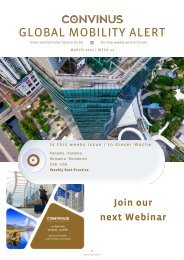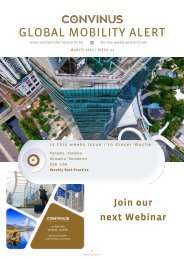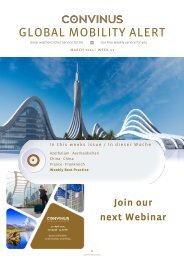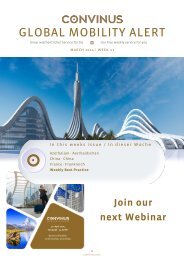CONVINUS Global Mobility Insights NEWSLETTER Herbst / Fall 2022
«Familiar expertise in a new look - the next generation of our popular CONVINUS newsletter is here! » To take the next steps, we have repackaged our popular newsletter and given it a modern layout. We cannot master the challenges in the Global Mobility sector alone, so we offer our great CONVINUS Global Network partners a special platform here. In each of our newsletters we will introduce you to some of them. The issues that concern you also concern us. For this reason, we are pleased to present the autumn issue 2022, with the following focus: «Remote Work / Digital Nomad / Home Office» • CONVINUS for the perspective from Switzerland • Globalization Partners for a global overview • Artus for the perspective from Austria • Corporate Relocations Greece for the perspective from Greece
«Familiar expertise in a new look - the next generation of our popular CONVINUS newsletter is here! »
To take the next steps, we have repackaged our popular newsletter and given it a modern layout. We cannot master the challenges in the Global Mobility sector alone, so we offer our great CONVINUS Global Network partners a special platform here. In each of our newsletters we will introduce you to some of them.
The issues that concern you also concern us. For this reason, we are pleased to present the autumn issue 2022, with the following focus: «Remote Work / Digital Nomad / Home Office»
• CONVINUS for the perspective from Switzerland
• Globalization Partners for a global overview
• Artus for the perspective from Austria
• Corporate Relocations Greece for the perspective from Greece
You also want an ePaper? Increase the reach of your titles
YUMPU automatically turns print PDFs into web optimized ePapers that Google loves.
<strong>Global</strong> <strong>Mobility</strong> <strong>Insights</strong> - <strong>Herbst</strong> / <strong>Fall</strong> <strong>2022</strong><br />
However, before you decide whether to hire traditional remote employees or<br />
digital nomads, consider these important differences between the two:<br />
DIGITALE NOMADS<br />
They can move from country to country as long as their<br />
passport allows them to stay as a tourist. Certain countries<br />
now offer new visas for digital nomads that allow them to<br />
spend several months in a single country.<br />
REMOTE EMPLOYEES<br />
Companies usually prefer remote workers to work in the<br />
same time zone. Due to most company policies, remote<br />
workers cannot stay outside the country where they were<br />
hired for more than a certain number of days, even if the<br />
country visited allows it.<br />
There is usually no defined work schedule, but they work<br />
according to the tasks that need to be done. This allows<br />
digital nomads the freedom to travel and explore cultures in<br />
different time zones. For these and other reasons, 90 % of<br />
digital nomads report high job satisfaction and 76 % report<br />
an income satisfaction.<br />
Typically, there is a daily work schedule that remote<br />
workers must adhere to - often along the lines of a 9am to<br />
5pm schedule.<br />
Digital nomads sometimes work on a freelance basis - an<br />
estimated 28%. In some cases, they have several clients at<br />
the same time.<br />
Remote employees have a fixed employment contract with<br />
a company in which they receive a benefits package and<br />
work on specific projects.<br />
They must pay taxes according to the country in which they<br />
are located. It is important to note that there are certain<br />
countries that require digital nomads who work as<br />
employees and their employers to pay taxes according to<br />
the laws of the country where the workers were hired and<br />
the country where the employees have temporarily settled.<br />
The company pays tax according to the laws of the location<br />
where the remote employee was hired.<br />
Where does your company stand<br />
Are there any obligations for your<br />
nomad visa?<br />
At this point, you are probably<br />
wondering what to do if one or<br />
several of your employees requests to<br />
relocate through a remote work visa.<br />
A good starting point is to put a<br />
mobility policy in place that sets out<br />
the circumstance where your<br />
company will permit an international<br />
move. This should include clarity<br />
around roles and responsibilities, and<br />
provide information on who will pay<br />
for moving expenses, what to do in an<br />
emergency, and who is responsible<br />
for whatever tax considerations your<br />
employee may have to undertake.<br />
company?<br />
As previously stated, digital nomad<br />
visas are meant for those employed<br />
by companies outside of the host<br />
country. Applicants will not be<br />
registered as employees in another<br />
country and are responsible for<br />
completing all the paperwork,<br />
figuring out the logistics of their<br />
move, and paying taxes, if applicable.<br />
Your company may offer to assist<br />
employees, but it is not under any<br />
obligations to do so.<br />
What are the tax implications if you<br />
have employees on remote work<br />
when your employees use a digital<br />
visas?<br />
20 convinus.com


